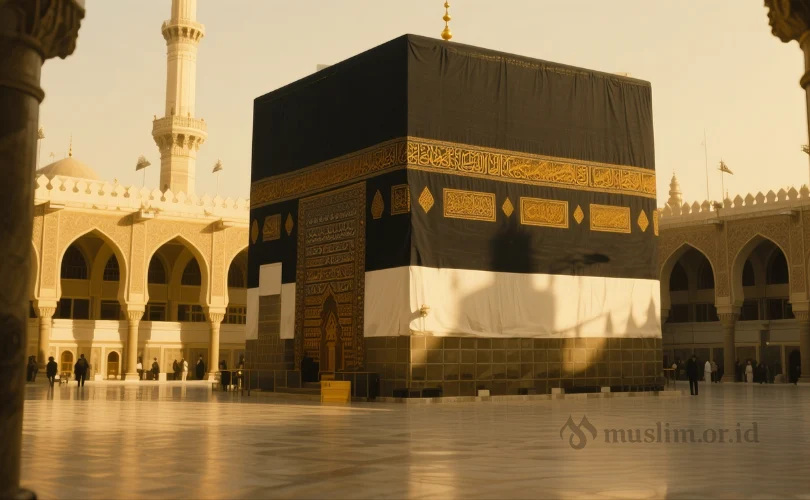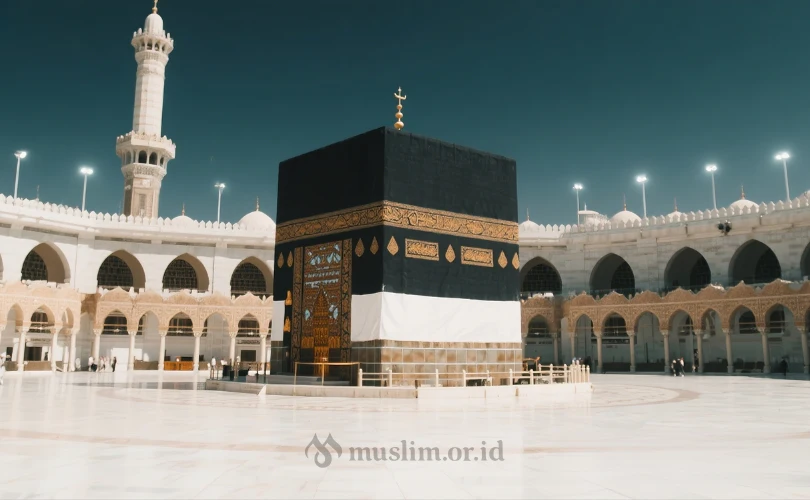From Jabir Radhiallahu ‘Anhu, he said:
Rasulullah SAW did not pray for people who died because they were in debt. The dead man was brought and he asked, “Did he have any debts?” They answered, “Yes, two dinars.” He said, “Pray.” To your friends
It was the Prophet sallallaahu ‘Alaihi wa Sallam who did not pray for men who were in debt. Then the corpse was brought before him. He said: “Does he have any debts?” They answered: “Yes, two dinars.” He said: “Pray for your friends.”
(HR. Abu Daud No. 3343, ratified by Shaykh Al Albani in Sahih wa Dhaif Sunan Abi Daud No. 3343)
From Abu Hurairah Radhiallahu ‘Anhu, that Rasulullah SAW said:
The soul of a believer is bound to his debt until it is paid off.
“The soul of a believer depends on his debt, until the debt is repaid.”
(HR. At Tirmidhi No. 1079, he said: hasan. Ibnu Majah No. 2413. Ahmad No. 10607. Al Baihaqi, As Sunan Al Kubra No. 6891, 11048, 11193, 17604 Syu’abul Iman No. 5543. Also in As Sunan Ash Shaghir No. 1615, 1812. Al Al Mustadarak No. 2219, Al Mu’jam Al Kabir No. 2591.
Shaikh Syu’aib Al Arnauth said: Sahih. (Tahqiq Musnad Ahmad Number 10607). Sheikh Husein Salim Asad said: hasan. (Tahqiq Musnad Abi Ya’la No. 6026). Imam Al Hakim declared it authentic according to Bukhari-Muslim standards, but neither of them narrated it. (Al Mustadrak Number 2219). Sheikh Al Albani said it was genuine. (Sahihul Jami’ No. 6779, Misykah Al Mashabih No. 2915. Sahih wa Dhaif Sunan At Tirmidhi No. 1078). Imam Ibn Hajar said this hadith was authentic by Imam Ibn Hibban and others. (Fatul Bari, 7/461). Imam Asy Syaukani said that the narrators of this hadith were tsiqat (credible), except for Umar bin Abi Salamah bin Abdirrahman, they were honest but there were mistakes. (Nailul ‘Authar, 6/114)
 Hadith lecture:
Hadith lecture:
A debt, even a small one, is still a debt, it must be paid before death. If not, it will become an obstacle for that person after his death. Even though he was a righteous man and a martyr. Therefore, the heirs should pay for the good of the deceased in the afterlife.
Imam Ash Syaukani Rahimahullah explained:
The intention is to urge the heirs to pay off the debts of the deceased and inform them that his soul depends on the debts until they are paid off.
In this hadith there is an encouragement for the heirs to pay off the deceased’s debts, and a message to them that the soul of the deceased depends on the debt, until the debt is paid off. (Nailul Authar, 4/23)
If it has not been paid in full, then the soul of the deceased is “hanging”…… What does depend mean?
Scholars differ in their opinions regarding the meaning of mu’allaqah (depending) in this hadith. Sheikh Abul ‘Ala Al Mubarfkafuri Rahimahullah explained:
The word Al-Suyuti means he was imprisoned from his honorable position, and the word Al-Iraq means his case was suspended, and he was not tried to be saved or destroyed until it was seen whether his debt was paid or not. End quote.
As Suyuthi said, that is, the person is held back from reaching his noble place. Meanwhile, Imam Al ‘Iraqi said that the person’s affairs had stopped (nothing was done), so they could not be judged as survivors or perished, until it was clear whether the debt had been paid or not. Finished. (Tuhfah Al Ahwadzi, 4/193)
There are also those who interpret that the person’s soul is sad (anxious) because of his debt. Imam Ash Shan’ani Rahimahullah said this as follows:
This hadith is an indication that people who die remain busy with their religion after their death. It contains a recommendation to dispose of it before death, and that is the most important right. If this applies to debts taken with the owner’s consent, then what about debts taken by force, plunder and plunder?
This hadith is one of the arguments which shows that the deceased will always be upset (masyghul) with his debts after he dies. In this hadith there is also a suggestion to clear one’s debts before one dies, because debt is the most important right. This is if the debt is given according to the owner’s willingness, then what happens to the property that takes it by force and confiscates it? (Subulus Salam, 2/92)
Not only that, Rasulullah Sallallahu ‘Alaihi wa Sallam also did not want to pray for a corpse that was still in debt, even though if he prayed for it it would be an intercession for the corpse. But he let his friends pray for him.
Imam Ibnul Qayyim Rahimahullah explained:
Every time a dead person was brought to him for prayer, he asked whether he was in debt or not? If he is not in debt, then he prays for it, and if he is in debt, he does not pray for it and lets his companions pray for him, then his prayer is intercession. His intercession is mandatory
If a body was brought to the Prophet sallallaahu ‘Alaihi wa Sallam, and he wanted to pray, he would ask, whether he had a debt or not? If he has no debt then He prays for him, if he has debt then He does not want to pray for him, but allows the companions to pray for the body. Indeed, His prayer (for the deceased, the pen) is an intercession (helper) and His intercession is a sure thing. (Zaadul Ma’ad, 1/503)
And, a dead person who is in debt is also prevented from entering heaven even if he is martyred. This is based on the following history:
From Abdullah bin Amr bin Al Ash Radhiallahu ‘Anhu, that the Prophet sallallaahu ‘Alaihi wa Sallam said:
People who are martyred will have all their sins except their debts forgiven.
“Those who die as martyrs are forgiven for all their sins except their debts.”
(HR. Muslim No. 1886, Ahmad No. 7051, Abu ‘Uwanah No. 7369, Al Hakim in Al Mustadrak No. 2554, Alauddin Al Muttaqi Al Hindi, Kanzul ‘Ummal No. 11110)
From Muhammad bin Jahsy Radhiallahu ‘Anhu, that Rasulullah SAW said:
By the One in Whose Hand my soul is, if someone is killed in the way of Allah and then brought back to life, then killed twice because he is in debt, then he will not enter heaven until his debt is paid in full. About him, his religion
By Whose Hands my soul is, if a man were killed in the way of Allah, then brought back to life, then he was killed again twice, and he still had a debt, then he would not enter Paradise until the debt was paid.
(HR. Ahmad No. 22546, An Nasa’i No. 4684, Ath Thabarani in Al Kabir No. 556 and Al Awsath No. 270, Al Hakim No. 2212, he said: authentic. Al Baihaqi in As Sunan Al Kubra No. 10754, ‘Abdu bin Humaid No. 367, Ibnu Abi ‘Ashim in Al Aahad wal Matsaani No. 928. Shaikh Al Albani said: Hasan.
Al Qadhi ‘Iyadh Rahimahullah explained:
This is a warning that human rights and the consequences that are due to a servant are not erased by good deeds, but rather by erasing what is between the servant and his Lord.
In this hadith there is a warning that the rights related to humans and their dependents cannot be abolished by righteous deeds, because righteous deeds only eliminate things related between humans and their Rabb. (Ikmalul Mu’allim, 6/155. Al Syarh Sahih Muslim, 6/362)
Imam Al Munawi Rahimahullah said:
What is meant by this is all the rights of the servants, such as blood, property and honor, because their martyrs are not forgiven, and that is for those who are martyred on land, but as for those who are martyred at sea, they are forgiven, even their debts are known.
The meaning of debt here is all human rights in the form of blood, property and honor. This cannot be forgiven by martyrdom, that is for martyrs in land war, there are also martyrs in sea war, so he is forgiven including his debts, based on the history about that. (Faidhul Qadir, 6/599. Cet. 1, 1415H-1994M. Darul Pole Al ‘Ilmiyah, Lebanon)
That is the fate of a debtor if he dies.
Then, what kind of debt or person in debt is meant by the above hadith? Does everyone go into debt and then die and things are like that? Or for a specific debt?
The debt above – which has a bad impact on the deceased – is a debt carried out by someone who has no intention of paying it off, even though he is able to. There are also those who intend to pay it off, but death comes too soon, or someone who does not have the means to pay it off, and he also intends to pay it off, then that is forgiven, even Allah Ta’ala will pay it.
Al Qadhi ‘Iyadh said:
This applies to someone who has the right to pay off his debt
This applies to people who have something (are able) to pay off their debts. (Al Ikmal, 6/155)
Said Imam As Syaukani Rahimahullah:
This is limited to people who have money to pay off their debts. As for a person who does not have money and dies with the intention of paying it off, there is evidence in the hadith which shows that God Almighty will pay it off for him.
This is tied to anyone who has assets that can pay off their debts. There are also people who do not have wealth and are determined to pay it off, so there are several hadiths which show that Allah Ta’ala will pay it off for them. (Nailul Authar, 4/23)
Imam Ash Shan’ani Rahimahullah also said:
This could happen to someone who borrows money and has no intention of paying it off
This means anyone who is in debt but has no intention of paying it off. (Subulus Salam, 3/51)
This is also what Imam Al Munawi said:
The discussion is about people who are disobedient by taking out loans. As for whoever borrows a loan in a lawful place and does not fail to repay it, he will not be imprisoned from heaven as a martyr or anyone else.
The discussion regarding this applies to anyone who fails to pay their debts. There is also a person who owes a debt in a lawful way and does not break his promise, then he will not be prevented from going to heaven either as a martyr or otherwise. (Faidhul Qadir, 6/559)
There are several narrations from the Prophet sallallaahu ‘Alaihi wa Sallam which show that people who are in debt then die without the ability, even though they intended to pay it off, Allah Ta’ala will pay it.
From Maimunah Radhiallahu ‘Anha, the Prophet sallallaahu ‘Alaihi wa Sallam said:
No Muslim has a debt that Allah knows he wants to pay off, but Allah will pay it off in this world.
“It is not that a Muslim is in debt, and Allah knows that he will fulfill it, but Allah Ta’ala will fulfill it in the world.”
(HR. Ibnu Majah No. 2408, Ibnu Hibban No. 5041, Ath Thabarani in Al Kabir No. 61, An Nasa’i No. 4686, also in As Sunan Al Kubra No. 6285. Ratified by Syaikh Al Albani, Sahih wa Dhaif Sunan Ibni Majah No. 2408, and Sahihul Jami’ No. 5677)
From Abu Hurairah Radhiallahu ‘Anhu, that Rasulullah SAW said:
Whoever takes someone’s money and wants to return it, Allah will pay it, and whoever takes it and wants to destroy it, Allah will destroy it.
“Whoever takes someone’s property and wants to return it, Allah will definitely reward him. Whoever takes it and wants to destroy it, Allah will destroy him.”
(HR. Bukhari No. 2387, Ahmad No. 8733, Al Baghawi in Syarhus Sunnah No. 2146)
 Conclusion:
Conclusion:
1. People who die – even if they are martyred – in a state of debt which they do not have the good will to pay off even though they have the ability to do so, Allah Ta’ala depends on their fate in the afterlife, because this debt cannot be erased by good deeds, except until the debt is paid off. So the heirs should know about this and pay it forward.
2. The Prophet sallallaahu ‘Alaihi wa Sallam did not pray for people who were in debt, but ordered his companions to pray for them. This means that the person does not get intercession from this party. A number of ulama said that people who are in debt should still be prayed for.
3. People who intend to pay their debts, or for people who don’t have the ability, but they die quickly and don’t have time to pay it off, then Allah Ta’ala will replace them in the afterlife, they are not among those criticized in the hadiths above.
Wallahu A’lam
✍ Farid Nu’man Hasan
Related
News
Berita
News Flash
Blog
Technology
Sports
Sport
Football
Tips
Finance
Berita Terkini
Berita Terbaru
Berita Kekinian
News
Berita Terkini
Olahraga
Pasang Internet Myrepublic
Jasa Import China
Jasa Import Door to Door












